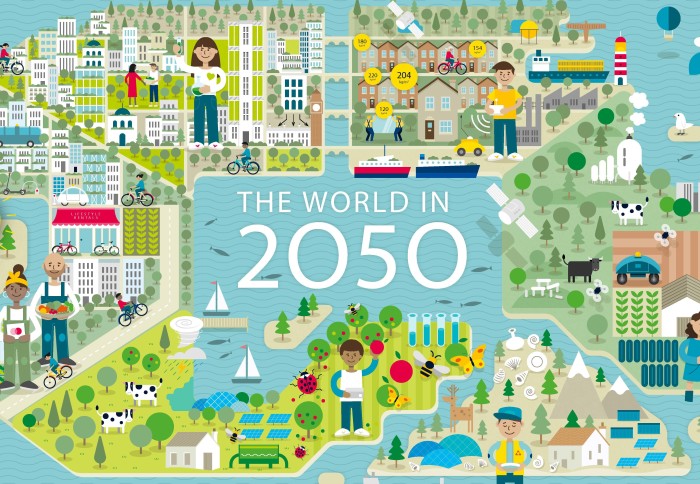Future visions and better balance: News from the College

Here’s a batch of fresh news and announcements from across Imperial.
From a vision of the world in 2050 if we successfully limit climate change, to awards recognition of a solution to help people with balance issues, here is some quick-read news from across the College.
The World in 2050
 Technology has revolutionised how we live today, but the planet is under extreme pressure. Humanity is having a devastating impact on the natural world, fuelling dangerous levels of climate change, more turbulent weather and destroying biodiversity.
Technology has revolutionised how we live today, but the planet is under extreme pressure. Humanity is having a devastating impact on the natural world, fuelling dangerous levels of climate change, more turbulent weather and destroying biodiversity.
So what would the world look like if we successfully limit climate change? Right now, inventors and entrepreneurs at Imperial are developing world-changing ideas that could transform our relationship with the planet.
Inspired by their work, the Grantham Institute and TechForesight have developed an interactive feature that depicts the world in 2050. It offers a positive vision of the future by exploring technologies that exist today in the context of the next 30 years. Explore the feature here.
For over ten years, the Grantham Institute has supported startups to transform bright ideas into useable products that create prosperity and help tackle climate change. The institute has just launched The Greenhouse, an innovation programme for climate positive technology startups. Find out more about how to apply.
New hope for IPF
 A natural metabolite, called itaconate, that is found in healthy lungs can put the brakes on lung disease. Idiopathic pulmonary fibrosis is a chronic disease which results in scarring of the lung, making it difficult to breathe. Patients with IPF do not make enough itaconate, which allows more severe scarring (fibrosis) to develop.
A natural metabolite, called itaconate, that is found in healthy lungs can put the brakes on lung disease. Idiopathic pulmonary fibrosis is a chronic disease which results in scarring of the lung, making it difficult to breathe. Patients with IPF do not make enough itaconate, which allows more severe scarring (fibrosis) to develop.
Using preclinical models Imperial researchers found that inhaled itaconate reduces fibrosis. Currently there are only two drugs approved for the treatment of IPF, this research highlights itaconate, or similar compounds, as a potential new therapy.
Read the publication from Byrne, Ogger et al. in Science Immunology: Itaconate controls the severity of pulmonary fibrosis
Education impact
 In some regions of the world poor education, low weight and passive smoking are of greater importance than tobacco smoking as a cause of chronic airflow obstruction.
In some regions of the world poor education, low weight and passive smoking are of greater importance than tobacco smoking as a cause of chronic airflow obstruction.
This reduction in the ability to breathe is a characteristic of COPD, for which dusty jobs and tuberculosis can also be risk factors. A new global study from Professor Peter Burney and colleagues has found great variation in the prevalence of breathing problems but confirmed worldwide the single most important risk factor is tobacco smoking.
The authors say more research is needed to understand the role of poor education and occupation, however this study should contribute to prioritise public health programmes across the world.
Read the publication in American Journal of Respiratory and Critical Care Medicine: Prevalence and population attributable risk for chronic airflow obstruction in a large multinational study.
Highly cited
 Thirty-five Imperial researchers have been listed among the world's most highly cited by Clarivate, in a list identifying scientists and social scientists who have demonstrated significant influence through publishing multiple highly cited papers.
Thirty-five Imperial researchers have been listed among the world's most highly cited by Clarivate, in a list identifying scientists and social scientists who have demonstrated significant influence through publishing multiple highly cited papers.
Professor Stephen Curry, Assistant Provost for Equality, Diversity and Inclusion, said: "It's pleasing that so many Imperial academics are among the world’s most highly cited researchers. It’s very rewarding to know that your papers are being read and put to good use! Our colleagues are clearly carrying out important work in everything from experimental physics to neuroscience to sustainable energy. That said, at Imperial we remain committed to assessing research on the basis of its inherent quality and researchers on the basis of the full breadth of their contributions within and beyond the College.”
Professor Curry is Chair of the San Francisco Declaration on Research Assessment (DORA), to which the College is a signatory. This commitment ensures that journal-based metrics are not considered in assessing the research achievements of staff or candidates for recruitment.
Better balance
 Innovation Design Engineering student WuQing Hipsh has been highly commended at the national Engineers in Business competition final for her innovation to tackle balance issues.
Innovation Design Engineering student WuQing Hipsh has been highly commended at the national Engineers in Business competition final for her innovation to tackle balance issues.
She won the trophy for developing WeAlign, a solution to help people with balance issues arising from inner ear and brain problems. The innovation, an online rehabilitation platform, also won WuQing second place in the College’s WE Innovate programme.
WuQing said: “The Engineers in Business Competition has introduced me to a network of inspiring start-ups, helped me hone my pitching skills, and practise thinking quickly during pitch Q&As. I’m so grateful that the judges want to highlight my project with the new, Highly Commended Award. I’m energised to continue to develop my business much further.”
–
Want to be kept up to date on news at Imperial?
Sign up for our free quick-read daily e-newsletter, Imperial Today.

Article text (excluding photos or graphics) © Imperial College London.
Photos and graphics subject to third party copyright used with permission or © Imperial College London.
Reporter
Ms Helen Johnson
Communications Division
Andrew Youngson
Communications Division
Lottie Butler
The Grantham Institute for Climate Change
Joanna Wilson
Communications Division